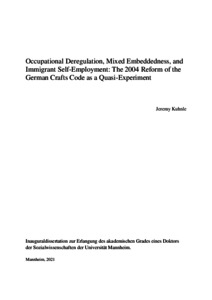|
Occupational deregulation, mixed embeddedness, and immigrant self-employment: The 2004 reform of the German crafts code as a quasi-experiment
Kuhnle, Jeremy
![[img]](https://madoc.bib.uni-mannheim.de/61856/1.hassmallThumbnailVersion/kuhnle_dissertation.pdf)  Vorschau |
|
PDF
kuhnle_dissertation.pdf
- Veröffentlichte Version
Download (2MB)
|
|
URN:
|
urn:nbn:de:bsz:180-madoc-618561
|
|
Dokumenttyp:
|
Dissertation
|
|
Erscheinungsjahr:
|
2021
|
|
Ort der Veröffentlichung:
|
Mannheim
|
|
Hochschule:
|
Universität Mannheim
|
|
Gutachter:
|
Hillmann, Henning
|
|
Datum der mündl. Prüfung:
|
30 September 2021
|
|
Sprache der Veröffentlichung:
|
Englisch
|
|
Einrichtung:
|
Fakultät für Sozialwissenschaften > Economic and Organizational Sociology (Hillmann 2009-)
|
|
Fachgebiet:
|
300 Sozialwissenschaften, Soziologie, Anthropologie
|
|
Freie Schlagwörter (Englisch):
|
self-employment , occupational licensing , quasi-experiment , difference-in-differences , ethnic entrepreneurship , occupational deregulation
|
|
Abstract:
|
As global migration numbers have continued to increase over the last thirty years, so have the number of self-employed immigrants. Faced with the task of integrating into the destination country’s labor market, millions of immigrants turn to self-employment. Nonetheless, it still remains unclear why some immigrants choose self-employment, while others do not. To investigate this question, I developed a novel identification strategy in which I used the 2004 reform of the German Crafts Code, which abolished occupational licensing in 53 of 94 crafts and trades, as a quasi-experiment. Specifically, I asked how expanding self-employment opportunities affect the self-employment decisions of women and immigrants and how the earnings of self-employed women and immigrants are affected by expanding self-employment opportunities. Using a difference-in-differences and regression discontinuity design, this dissertation provides some first causal evidence of the effect of occupational deregulation on the self-employment outcomes of women and immigrants. The results demonstrate that removing entry restrictions for self-employment enables those groups with more resources to open up their own business and increase their earnings, while those with less resources are unable to do so. These results suggest that individual resources become more important as the occupational structure becomes less rigid.
|
 | Dieser Eintrag ist Teil der Universitätsbibliographie. |
 | Das Dokument wird vom Publikationsserver der Universitätsbibliothek Mannheim bereitgestellt. |
 Suche Autoren in Suche Autoren in
Sie haben einen Fehler gefunden? Teilen Sie uns Ihren Korrekturwunsch bitte hier mit: E-Mail
Actions (login required)
 |
Eintrag anzeigen |
|
|
 ORCID: 0000-0001-9916-3659
ORCID: 0000-0001-9916-3659



 Suche Autoren in
Suche Autoren in